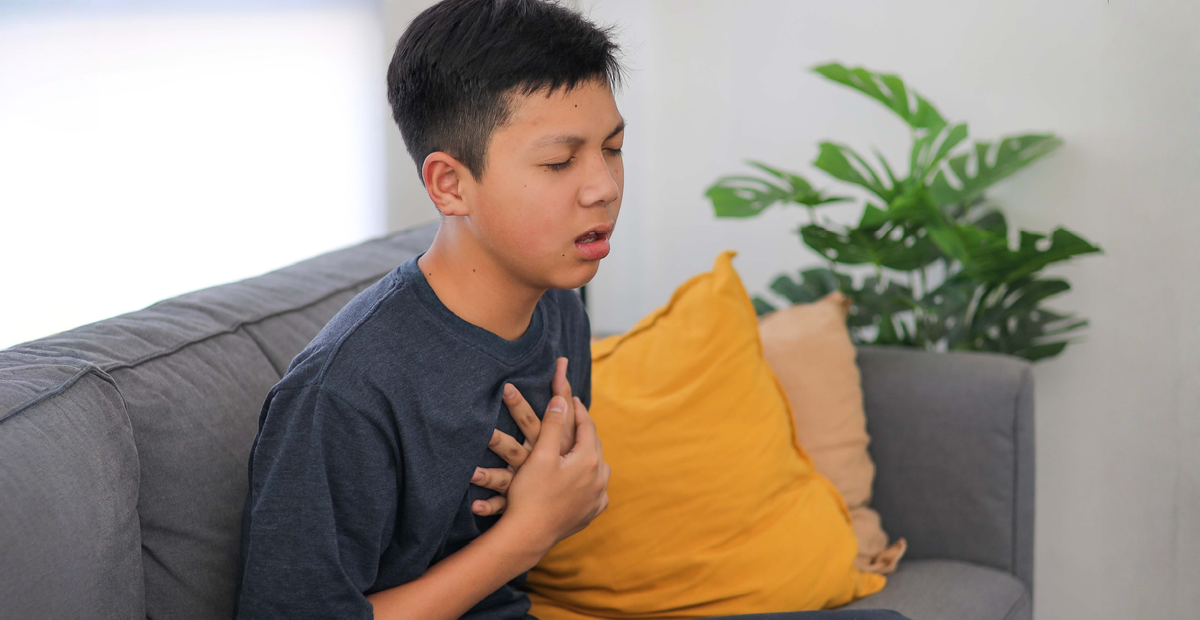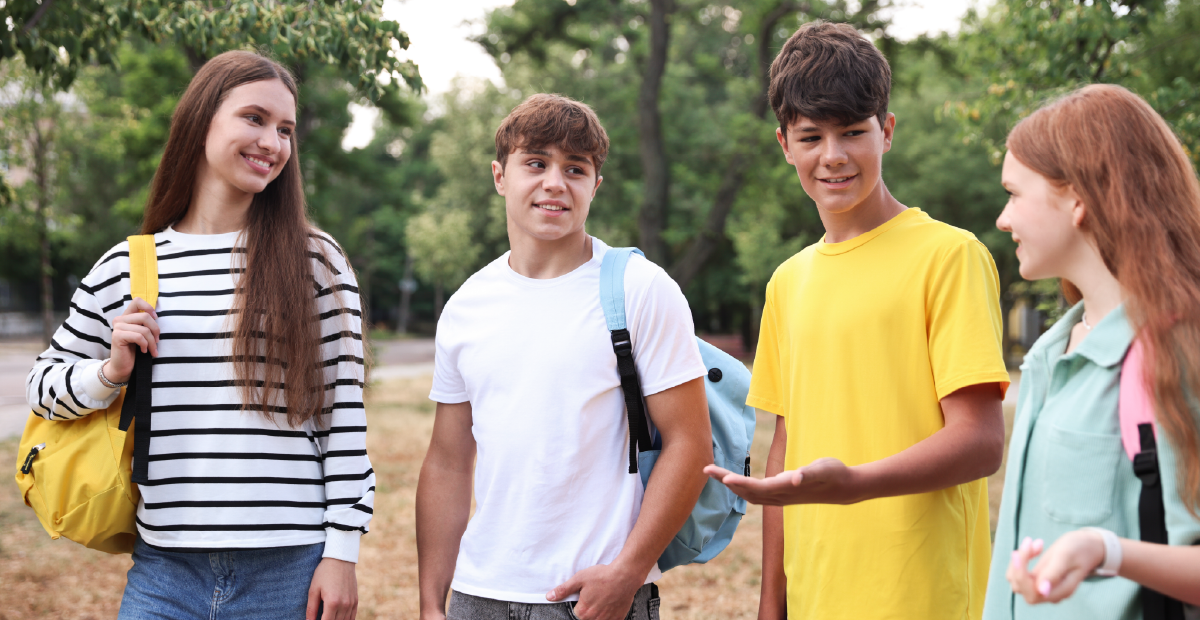Table of Contents
Anxiety is a widespread mental health problem affecting a majority of teens across the US. High academic expectations, political instability, financial insecurity, community violence, and social media are just some of the factors influencing the steep rise in anxiety observed over the past decade.
Unresolved anxiety can wreak havoc on teenage development, leading to problems like low self-esteem, aggression, unstable relationships, chronic disease, and substance abuse. It can be difficult for parents to watch their once confident and adventurous child develop anxiety and struggle with their self-esteem. Fortunately, anxiety is one of the most treatable mental health disorders in teens.
From research-backed mental health therapies that help reframe anxious thought patterns to medication and lifestyle changes that can improve brain health, read on to explore proven ways to treat anxiety in teens.
Understanding Anxiety in Teens
Over 50% of teens report struggling with anxiety at one point or another, and nearly 32% are diagnosed with an anxiety disorder. Anxiety is when the brain goes into survival mode, increasing activity in the nervous system and tension throughout the body. It causes feelings of dread, worry, and, in some cases, extreme fear [1].
There are several kinds of anxiety disorders characterized by their own set of triggers or symptoms. These include:
- Generalized Anxiety Disorder is one of the most common anxiety disorders and refers to worry, tension, fear, and general stress about everyday things that last for at least 6 months. Anxiety can be related to school, relationships, current events, the future, and non-realistic situations.
- Social Anxiety Disorder affects 1 out of 3 teens and is emotional distress in groups or social settings. Teens may struggle with self-esteem, communication, and managing relationships. Social anxiety can increase feelings of isolation, especially in peer environments [1].
- Phobias are fear or stress around a specific object or situation. It’s normal to have fears, however, phobias go above and beyond, often interrupting a teen’s daily functioning and causing persistent emotional distress.
- Panic Disorder is characterized by ongoing panic attacks. A panic attack is an intense wave of physical symptoms like blurry vision, dizziness, nausea, increased heart rate, and chest pain. Teens experiencing panic attacks may feel like they are dying, losing control, having a heart attack, or going crazy.
Anxiety is caused by a combination of biological, environmental, and emotional factors. Some teens are genetically predisposed to developing mental health problems or have a lower tolerance for distress. Others have anxiety triggered by the expectations of everyday life, academic stress, social media, or peer pressure. Youth who have experienced trauma like abuse, neglect, natural disasters, car accidents, school shootings, or foster care are also likely to have higher anxiety levels.
What Works Best for Teen Anxiety Treatment?
There is no one-size-fits-all approach to treating anxiety in teens. Some teens see an improvement in anxiety just after small lifestyle changes, while others require mental health therapies and medication.
Evidence-Based Therapies
Evidence-based mental health therapies are backed by research and recognized by major organizations like the American Psychological Association, National Alliance on Mental Illness, and National Center for PTSD as a first line of treatment for mental health disorders.
Effective mental health therapies used to treat anxiety in teens include:
- Cognitive Behavioral Therapy (CBT) helps teens reframe negative thoughts, reframe how they perceive situations, and build practical coping skills to manage life challenges.
- Dialectical Behavior Therapy (DBT) reduces anxiety by teaching teens how to tolerate distress, encouraging them to stay in the present and not allow negative emotions to control their mood or behavior.
- Exposure Therapy is most commonly used for social anxiety and phobias. It gradually exposes teens to their fears in a safe and structured setting.
- Eye Movement Desensitization and Reprocessing (EMDR) and other trauma-focused therapies help teens process traumatic memories stored deep in the brain and reduce associated emotional distress and anxiety.
Holistic and Experiential Approaches
Holistic approaches focus on treating the physical, emotional, and spiritual health of teens with anxiety. They help teens positively cope with stress, release tension, improve mood, increase energy, and boost overall emotional well-being.
Holistic therapies do not have enough clinical research to be recognized as evidence-based. However, many individuals report improvement in their symptoms, especially when combined with conventional mental health therapies, lifestyle changes, and medication.
- Mindful Movement: Practices like yoga, deep progressive muscle relaxation, and tai-chi combine physical activity with mindfulness to improve mood and decrease stress.
- Energy Healing: Reiki, chakra work, and massage therapy can help stimulate energy centers in the body that hold anxiety, stress, and tension.
- Creative Arts: Experiential therapies like dance and movement, music therapy, and drama help teens express their emotions, boost self-esteem, and can be a powerful way to facilitate healing from anxiety. Research has found that art therapy releases dopamine, a brain chemical responsible for feelings of happiness, pleasure, and well-being [2].
- Animal-Assisted Therapies: Equine (horse therapy), puppy therapy, and farm animal therapy are some common animal-centered approaches to helping teens reduce stress levels. Studies have found that spending time with animals or in nature can increase feel-good chemicals in the brain, and fight feelings of anxiety and depression [3].
Lifestyle Changes
A key part of recovering from anxiety is implementing positive lifestyle changes that lower stress and boost health and wellness. Making small lifestyle changes is an easy and accessible way for teens to take the first steps toward positive mental health. These include:
- Daily Exercise: According to experts, teens should get 60 minutes of moderate to vigorous physical activity daily. Activities include running, playing sports, biking, swimming, or weightlifting. Exercise helps with feelings of anxiety by increasing circulation and energy levels, mental clarity, and producing feel-good chemicals in the brain known as endorphins [4].
- Balanced Diet: Our gut microbiome plays an important role in producing and managing neurotransmitters that regulate stress and anxiety levels. A diet rich in fresh, organic fruits, vegetables, healthy fats (omegas), and lean proteins can help improve mental health. Some studies show that probiotics like yogurt or fermented vegetables can also positively impact anxiety. Keep processed or greasy foods high in additives or preservatives and sugary drinks like soda out of the home [5].
- Sleep: The National Sleep Foundation recommends that teens sleep 8-10 hours each night. Unfortunately, most teens average 6-7 hours. Encourage your teen to relax their mind and unwind in the evenings, set limits on phone, TV, and computer time. If your teen struggles to sleep, consider getting them some lavender spray, child melatonin, or encouraging them to take a bath, or listen to music before bedtime [6].
Medication
Medication can be helpful for teens with anxiety who have tried therapy, holistic approaches, or lifestyle changes and have still seen no improvement in symptoms. It is also effective in treating physical symptoms of anxiety, such as panic attacks.
- Antidepressant SSRIs like Prozac, Lexapro, and Zoloft are commonly prescribed for depression in teens to regulate serotonin levels. They are also used for teens with anxiety disorders to improve symptoms that affect functions like appetite or sleep.
- Benzodiazepines like Xanax, Valium, or Ativan are a class of tranquilizers used to stop anxiety and panic attacks. They quickly cause feelings of relaxation and euphoria. However, they are not commonly prescribed to teens as they carry a high risk of addiction.
- Alternative Medicine like vitamins, supplements, and herbs may be recommended by some child psychiatrists who take a holistic approach and avoid prescribing psychiatric medication to youth if possible. They may recommend more natural alternatives to begin with, such as magnesium, B vitamins, Vitamin D-3, valerian root, or chamomile tea. They have all been reported to improve symptoms of anxiety.
The Role of Residential Treatment in Teenage Anxiety Recovery
Residential treatment is a form of inpatient mental health treatment where teens participate daily in therapies, medication management, and recreational activities. It is considered the highest level of care where teens are removed from their homes, communities, and daily lives to live full-time at a treatment facility.
Teens with mild to moderate anxiety disorders often don’t require residential treatment. Unless their anxiety is accompanied by symptoms of psychosis, drug or alcohol use, or other behaviors that put themselves or others at risk. Outpatient therapy is an ideal choice for treating anxiety disorders, with a response rate of 40% to 80% for helping teens recover from anxiety [7].
Evidence-Based Mental Health Treatment for Teen Anxiety
Clearfork Academy residential facility is a licensed treatment program with 24/7 supervision, helping teens recover from depression and other mental health or substance abuse disorders.
We provide around-the-clock care and support to teens on their journey toward sobriety and wellness. We offer evidence-based treatments such as CBT, DBT, and EMDR and strive to educate parents about mental health.
Contact our admissions team today to see how we can support your family.
Sources
[1] Mental Health of Adolescents. 2024. World Health Organization.
[2] Anxiety and Art Therapy. 2023. British Association of Art Therapists.
[3] Assessing the effectiveness of animal-assisted therapy on alleviation of anxiety in pre-school children: A randomized controlled trial. 2022. National Library of Medicine.
[4] Physical activity guidelines for children and young people. 2024. NHS.
[5] The Role of Gut Microbiota in Anxiety, Depression, and Other Mental Disorders. 2023. National Library of Medicine.
[6] What To Know About Teens and Sleep. 2024. National Sleep Foundation.
[7] Treatment for Anxiety Disorders: Efficacy to Effectiveness to Implementation. 2010. National Library of Medicine.
Austin Davis, LPC-S
Founder & CEO
Originally from the Saginaw, Eagle Mountain area, Austin Davis earned a Bachelor of Science in Pastoral Ministry from Lee University in Cleveland, TN and a Master of Arts in Counseling from The Church of God Theological Seminary. He then went on to become a Licensed Professional Counselor-Supervisor in the State of Texas. Austin’s professional history includes both local church ministry and clinical counseling. At a young age, he began serving youth at the local church in various capacities which led to clinical training and education. Austin gained a vast knowledge of mental health disorders while working in state and public mental health hospitals. This is where he was exposed to almost every type of diagnosis and carries this experience into the daily treatment.
Austin’s longtime passion is Clearfork Academy, a christ-centered residential facility focused on mental health and substance abuse. He finds joy and fulfillment working with “difficult” clients that challenge his heart and clinical skill set. It is his hope and desire that each resident that passes through Clearfork Academy will be one step closer to their created design. Austin’s greatest pleasures in life are being a husband to his wife, and a father to his growing children. He serves at his local church by playing guitar, speaking and helping with tech arts. Austin also enjoys being physically active, reading, woodworking, and music.




